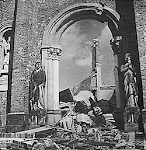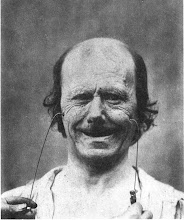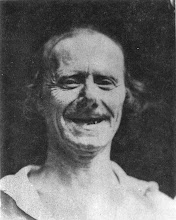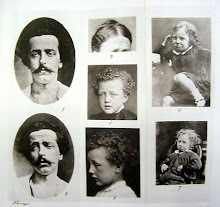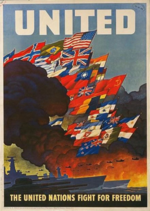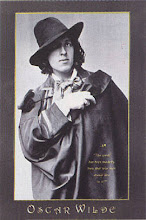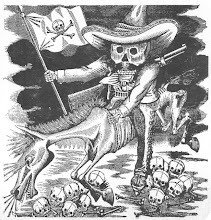Saturday, November 8, 2008
Election tropes
Friday, November 7, 2008
Election schemes
Finally the election is over--a fair field full of fury. (alliteration).
The Republicans now suffer, but we also rejoice in our sufferings, because we know that suffering produces perseverance; perseverance, character; and character, hope. And hope does not disappoint us. (anadiplosis).
And now for some fairness in society: I say, don't hold back. Strike as I would. Have struck those tyrants! Strike deep as my curse! Strike! and but once (anaphora).
How the last eight years have seemed to me: The helmsman steered; the ship moved on; yet never a breeze up blew. (anastrophe).
All those who are merciful with the cruel will come to be cruel to the merciful. (antimetabole).
Response to paliniacs: Not that I loved Caesar less', but that I loved Rome more. (antithesis).
Now they seek That solitude which suits abstruser musings. (assonance).
We must... hold them, as we hold the rest of mankind, Enemies in War, in Peace Friends. (asyndeton, chiamus)
May we find all of this Republicanism ...Lost, vaded, broken, dead within an hour. (climax- the noun, not the verb).
Republicans leaving DC: What is Hecuba to him, or he to Hecuba? (epanalepsis).
Where affections bear rule, there reason is subdued, honesty is subdued, good will is subdued, and all things else that withstand evil, for ever are subdued. (epistrophe).
To the rovians and paliniacs: Bloody thou art; bloody will be thy end. (hyperbaton).
And the louder they talked of their honor, the faster we counted our spoons. (isocolon).
When you are right you cannot be too radical; when you are wrong, you cannot be too conservative. (parallelism).
I’ve had to resist and to attack sometimes – that’s only one way of resisting – without counting the exact cost, according to the demands of such sort of life as I had blundered into. (parenthesis)
I spent several days and nights in early November with an ailing pig and I feel driven to account for this stretch of time more particularly since the pig died at last, and I lived, and things might easily have gone the other way round and none left to do the accounting. (polysendeton).
Tuesday, November 4, 2008
American Death Penalty-Part 1
Once upon a time, even before the United States was a country, we had a death penalty. To some extent it existed in the northern colonies to punish religious heretics and witches and the like, but for the most part it was in the southern colonies to help enforce slavery. Many things related to slavery were capital crimes including helping slaves escape and inciting slaves to run away. Even to this day, the slave states are where we find most of the executions.
The English Bill of Rights in 1691 had prohibited cruel and unusual punishment and then the Eighth Amendment was adopted in 1791 saying about the same thing. This was not meant to end the death penalty though, but only torture before causing death. Also, although states had their own prohibitions against cruel or unusual punishment, this part of the Eighth Amendment did not originally apply to the states. The Supreme Court in In Re Kemmler in 1889 rejected an argument that the 8th Amendment applied to the New York when this state started electrocuting people to kill them.
Finally, in the case of Robinson v. California in 1962 the prohibition against cruel and unusual punishment was applied to the states, but this was not a death penalty case, but prohibited imprisoning Mr. Robinson just because he was a drug addict and had needle tracks in his arms. But we get ahead of the story.
The historical link between slavery and the death penalty held sway as the northern states moved into a period of reforming the death penalty before the civil war. The southern states saw a need to discipline a captive workforce and had no similar reform movement. The racist purpose for capital punishment was openly discussed. This situation became a national embarrassment when the racism in using the death penalty became an international incident when the Scottsboro Boys were sentenced to death. When the seven young black men accused of rape were given the death penalty, essentially without lawyers and with little evidence, the nature of the American death penalty was given an international stage. The Supreme Court in 1932 decided the case of Powell v. Alabama. There were many glaring problems with the sentence, but the court found a way to correct the embarrassment of this one case without greatly impacting the system of using the threat of death to control an oppressed caste. The Court did not say a capital defendant should always have a lawyer, but that in a capital case where the defendant is unable to employ counsel and is incapable of adequately making his own defense because of ignorance, feeble-mindedness, illiteracy or the like, he should get a lawyer.

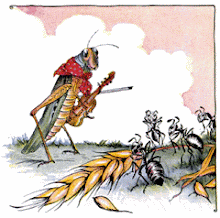













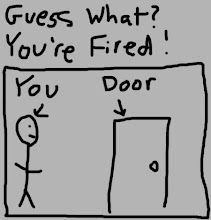
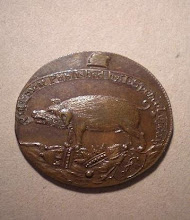









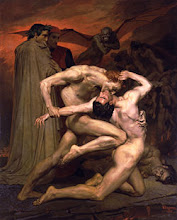_-_Dante_And_Virgil_In_Hell_(1850).jpg)



